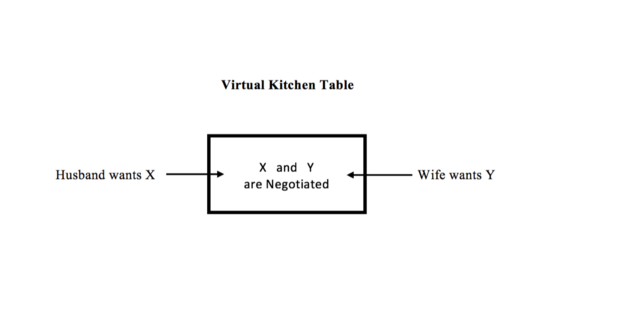Relationships
How to Create a Transformational Relationship
...not a transactional one.
Posted April 22, 2021 Reviewed by Devon Frye
Key points
- Transactional relationships are built around the notion of reciprocity—you solve my needs, I solve yours.
- But marital research shows that while reciprocity can be seductive, transactional relationships tend not to be happy ones.
- Most couples implicitly believe they will live better together than they do apart—in other words, that marriage can be transformational.
- A transformational marriage is based on achieving intimate interactions and being willing to negotiate marital issues collaboratively.
How we interact with our intimate partners will define much of how we experience our world—so let’s figure out how to do it well.
Marriage Can Benefit From a "Relationship Contract"—Right?
We all want to do nice things for our partner, and we all want to do our fair share around the house, right? To accomplish this, some couples create a formal "contract "spelling out everything from sex to chores to finances, etc. Even Mark Zuckerberg and Priscilla Chan reportedly hashed out some specific details in their contract, such as: “One date per week, a minimum of a hundred minutes of alone time, not in his apartment and definitely not at Facebook.”[1]
Even if they don’t have a formal contract, couples do opt for informal agreements, written or verbal, detailing who’s responsible for what. This contractual approach is based on the general notion of reciprocity. That is, if I do something for you, I expect a return; you owe me. It’s the business model of relationships. In this approach, a "marital or relationship" contract is typically proposed so that things "even out." Interactions in marriage thus become transactions.
The notion often promoted in the popular media and the academic press that marital happiness is the outcome of fulfilling each other’s "needs" fits into this notion of marital transactions. The idea that we are motivated by our "needs" is based on the general idea that we are all motivated primarily—or only—by self-interest (remember the "selfish gene".
"Needs" become demands that we feel entitled to have fulfilled. Because "needs" are seen as entitlements, they cannot be negotiated; they have to be exchanged like a quid pro quo business transaction—I’ll have sex with you if you will spend more time talking to me.
People who promote this view also tend to adopt the idea that men and women have biologically determined, inherent, and enduring different needs (e.g., men are from Mars and women are from Venus). In this view, husbands and wives must fulfill each other’s biologically based gender needs. And not having your needs met is justification for divorce.
Why Marriage Cannot Be Reduced to a Series of Transactions
Most people who marry want an intimate relationship that supports the individual life plans of both people. There is an implicit belief that they can accomplish this together better than they can as individuals. Of course, there is usually also physical attraction—the wish for a vibrant and satisfying sexual relationship. These wants and desires usually take place in the context of setting up a household, which, of course, brings its own opportunities for working together on a project as well as the pitfalls of deciding who does what.
It can be tempting to want to mandate by contract how to manage all of this complexity—intimacy, children, careers, households… even community and country. But marriages organized by contractual reciprocity are not likely to be happy marriages. [2]
How Intimacy and Negotiation Create a Great Marriage
Marriage is best understood as an interpersonal endeavor, i.e., it is about what is happening between the two of you. What is happening between you is about intimacy and negotiation.
Intimacy
Interactions between you and your spouse have a unique quality that makes them intimate. [For more on how to enhance intimacy-in-your-relationship, see this post.] An intimate interaction involves one of you disclosing or sharing some part of yourself and your partner listening and responding to that disclosure. This kind of interaction promotes intimacy because:
- You reveal something personal about yourself to your partner (or vice versa).
- Your partner responds attentively to your disclosure.
- Each of you is willing to be self-disclosing and attentive.
- Intimacy supports ongoing self-disclosure and paying attention to each other.
To be able to disclose things about yourself, you have to be aware of what you are thinking and feeling. This can only be achieved through self-reflection. Here is a good description of why self-reflection is important to you and to the quality of your relationship.
Self-reflection involves the conscious consideration of what you are thinking and how you are acting. [3] This kind of reflection gives your brain time to pause, in the midst of your ongoing life, to sort through your experiences, considering many possible interpretations of these experiences. These reflected interpretations allow you to learn about yourself. It is this kind of self-reflection that can be disclosed to your partner, doing your part in building intimacy.
Negotiation
Negotiating in marriage begins with idea that through self-reflection you can identify the things that are important to you in your life—things that are expressed as wants and desires. Negotiating is both identifying your wants in any given situation and being willing to express them. These wishes are stated and the reasons for them are provided. It is as if each of you put these wishes on a virtual kitchen table where agreement, differences, and disagreements become apparent.
The schematic below depicts the idea that wants are openly stated, looked at side-by-side, and negotiated so that each want is honored. The schematic depicts clearly the idea that disagreements and/or differences are between the two of you, not within either of you. (More about how to negotiate.)

The negotiation that takes place in marriage is not a transaction—nor is it a quid pro quo (tit for tat, you do this for me, and I will do that for you) kind of negotiation. Negotiating in marriage has the following characteristics:
- Each partner is a valuable person in his/her own right.
- Each partner is able to identify wants and desires.
- Each partner can explain (not justify) what is important about the stated wants and desires.
- Neither partner seeks to “privilege” his or her wants and desires over the other’s because of status such as gender or wage earner.
- Each partner is willing to take action based on the negotiation of wants and desires.
Negotiating with each other in good faith requires collaboration. Here are some thoughts about what collaboration means. [4]
- Collaborators are equal. True collaborators are always equals who share authority and accept personal responsibility to negotiate in good faith.
- Collaboration is not capitulation. Collaboration protects individual autonomy. Most of us have a (possibly subconscious) fear of being overwhelmed by someone and are reluctant to surrender any part of our autonomy in a relationship.
- Collaboration is not cooperation. Collaboration is about the process of working together, while cooperation is about the result of working together. For example, I can cooperate with you by stepping aside while you do what you want to do.
Pitfalls to Intimacy and Negotiation
Men and women often bring different histories and experiences to their relationships, which results in different resistances and difficulties in achieving intimacy and being effective negotiators.
Pitfalls for men. Men may have to work at the business of self-reflection and self-disclosure. (More about self-reflection for men.) They may not always see the connection between self-disclosure and intimacy. To the degree that men align themselves with the world of business, they may rely subconsciously on the idea of transactions as the basis of interpersonal interactions.
Pitfalls for women. Women may have difficulty in the idea of negotiating wants and desires, tending to be deferential to their partners. Negotiation requires being clear about what is important to you and putting it on the table.
The pitfall for both men and women is to get attached to the idea of "need" as a way of talking about what you want in life. (More about needs.) Unfortunately, the notion of "need" doesn't require explanation—it just is. There is often a demanding quality to these justified "needs." This is seductive for all of us—a seduction we must avoid.
A Great Marriage is a Transformational One
In happy marriages, partners find a way to make choices about their careers, take care of their children, and share tasks, while also feeling good about their partners. They can create a relationship that is transformational.
A transformational relationship based on intimacy and collaborative negotiation can change you, can help you become a better person than you think you are, enlarge the love you feel toward your spouse, create a more meaningful life than you expected, launch children who can become better people than they thought they could be, and, maybe, help create a better world. (An example.)
References
1. Gottman, J. and C. Dollard. "Five Myths About Marriage." Chicago Tribune. June 14, 2018. https://www.chicagotribune.com/ct-five-myths-about-marriage-20180614-st…
2. Gottman and Dollard
3. Porter, Jennifer. “Why You Should Make Time for Self-Reflection (Even if You Hate Doing It). Harvard Business Review. March 21, 2017. https://hbr.org/2017/03/why-you-should-make-time-for-self-reflection-ev….
4. Coulson, Christopher. “What is Collaboration?” DynamicLivingTM. http://www.santafecoach.com/dl/oct03.htm#parting.




